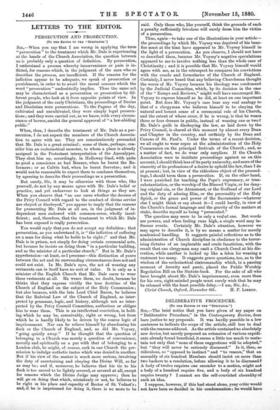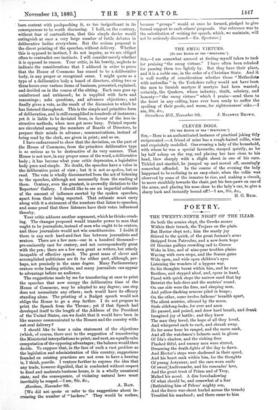DELIBERATIVE PROCEDURE.
[To THE EDITOR OP THE " SPECTATOR."] Six,—The brief notice that you have given of my paper on " Deliberative Procedure," in the Contemporary Review, does bare justice to my proposals. It was hardly possible in a few sentences to indicate the scope of the article, still less to deal with the reasons adduced. As the article contained no absolutely new device, but merely proposed an extension of various-expedi- ents already found beneficial, it seems a little too much to main- tain not only that "none of these suggestions will be adopted," but "they will never be seriously discussed." Is it, then, so ridiculous, so " opposed to instinct" and " to reason," that an assembly of six hundred Members should insist on more than two backers to a resolution, before allowing it to be discussed? A body of twelve requires one seconder to a motion, might not a body of a hundred require five, and a body of six hundred require twenty ? I cannot see the self-convicted absurdity of such an idea.
I suppose, however, if this had stood alone, Yon! critic'worad not have been so decided in his condemnation; he,would-have been content with poohpoohing it, as too insignificant in its consequences to be worth discussing. I hold, on the contrary, without fear of contradiction, that this simple device would extinguish at once a very large number of futile debates in deliberative bodies everywhere. But the serious proposal is the direct printing of the speeches, without delivery. Whether this is opposed to instinct, I do not inquire, as we are obliged often to contradict our instincts. I will consider merely whether it is opposed to reason. Your critic, in his brevity, neglects to indicate the considerations that I adduced in order to prove that the House of Commons has ceased to be a deliberative body, in any proper or recognised sense. I might quote as a type of a deliberative body a board of directors, sitting two or three hours over various items of business, presented, explained, and decided on in the course of the sitting. ..Each man goes up uninformed and unbiassed; he is Supplied with facts and reasonings ; asks questions, and advances objections ; and finally gives a vote, as the result of the discussion to which he has listened throughout. This is the simple and primitive form of deliberation, and is still exemplified in hundreds of instances ; yet it is liable to be deviated from, in favour of the less in- structive methods, when men get more busy. Printed reports are circulated among the members of Boards of Directors, to prepare their minds in advance ; communications, instead of being read by the clerk, are given in print; and so on.
I have endeavoured to show that the deviation, on the part of the House of Commons, from the primitive deliberative type is so serious as to be destructive of its very essence. That House is not now, in any proper sense of the word, a deliberative body ; it has become what your critic deprecates, a legislative body pure and simple. No doubt, the speeches have a value in the deliberative point of view ; .but it is not as spoken, but as read. The vote is wholly disconnected from the act of listening to the speeches, although not necessarily from the reading of them. Oratory, even the greatest, is avowedly dictation to the Reporters' Gallery. I should like to see an impartial estimate of the amount of influence exerted by the spoken speeches, apart from their being reported. That estimate must carry along with it a statement of the numbers that listen to speeches, and some proof that these listeners have their votes influenced thereby.
Your critic adduces another argument, which he thinks crush- ing. The changes proposed would transfer power to men that ought to be journalists, instead of men who ought to be orators, and these journalists would not win constituencies. I doitbt if -there is any such hard-and-fast line between journalists and orators. There are a few men—one in a hundred thousand— pre-eminently cast for oratory, and not correspondently great with the pen ; there are a few men great as writers, but utterly incapable of effective speech. The great mass of clever and accomplished politicians are fit for either part, although, per- haps, not precisely in the same degree. Many Parliamentary orators write leading articles, and many jonrnalists can appear to advantage before an audience.
The suggestions made by me for transferring at once to print the speeches that now occupy the deliberative time of the House of Commons, may be adopted to any degree; one step does not necessitate any others ; each would have its efficacy standing alone. The printing of a Budget speech would not oblige the House to go a step farther. I do not propose to print the Speech from the Throne ; yet if that Speech had developed itself to the length of the Address of the President of the United States, can we doubt that it would have been in like manner communicated to the Houses and the country with- out oral delivery P
I should like to hear a calm statement of the objections (which, of course, there are) to the suggestion of transferring the Ministerial interpellations to print; and next, an equally calm computation of the opposing advantages ; the balance would then decide. To suppose that, in the face of such a vast problem as the legislation and administration of this country, suggestions founded on existing practices are not even to have a hearing is, I think, puerile. I venture farther to express the idea that any trade, however dignified, that is conducted without respect to fixed and moderate business hours, is in a wholly unnatural state, and the consequence, of violating natural laws must inevitably be reaped.—I am, Sir, &c., Aberdeen, November 9th. A. Beni'. [We did not quote or refer to the suggestions about in- creasing the number of. "backers." They would be useless, because " groups " would at once be formed, pledged to give formal support to each others' proposals. Our reference was to the substitution of writing for speech, which, we maintain, will not be seriously discussed.—En. Spectator.]



































 Previous page
Previous page